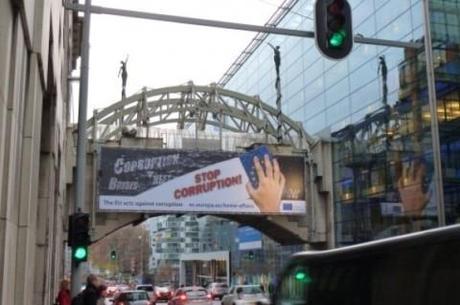
In this 2011 file photo, a billboard is shown on the Rue Belliard in the European district of Brussels THOMSON REUTERS FOUNDATION/Maria Sanchez-Marin
This post originally appeared on the Thomson Reuters TrustLaw blog.
The European Union (EU) is taking a hard look at corruption in its midst, having recently published its first-ever corruption monitoring report. The results are striking: the estimated cost of corruption in the EU’s 28 member states equals €120 billion, a figure nearing the EU’s annual budget.
A sense of corruption problems in Europe has been pervasive in the news. In Spain, Princess Cristina and her husband have been embroiled in a case centered on the alleged embezzlement of €6 million in public funds. In the Czech Republic, Prime Minister Petr Necas resigned after a scandal involving illegal surveillance andgraft. He has been recently charged with bribery for offering state posts to former opposition members in return for them leaving office. In Italy, former premier Silvio Berlusconi is back in court (again) on charges of giving a €3million bribe to an opposition politician to switch sides. And the Romanian Parliament voted to exempt top politicians from corruption liability.
Not surprisingly, popular perceptions of corruption captured in the report are rather dire. Three-quarters of surveyed respondents think that corruption is widespread in their country. This perception is the highest in Greece (99 percent), Italy (97 percent ), Lithuania, Spain, and the Czech Republic (95 percent in each). In addition to political corruption, public procurement and management of state-owned companies give rise to elevated levels of corruption perceptions, especially in the private sector. At least four out of 10 companies believe corruption, including patronage and nepotism, is a problem for doing business. The percentage of companies that perceive corruption as detrimental to their businesses is even higher in specific sectors: 50 percent in construction and 33 percent in telecoms/IT companies. The report also notes, “The smaller the company, the more often corruption and nepotism appears as a problem for doing business.”
Despite such high levels of corruption perceptions, averaging 74 percent for the EU as a whole, personal experience with corruption is much lower. Just 8 percent of Europeans say they have experienced or witnessed corruption in the past 12 months. At the same time, there is a sizable variation in corruption experience across the EU, with the newer members faring worse. Respondents are least likely to say they have experienced or witnessed corruption in Finland and Denmark (3 percent in each), while most likely to say so in Lithuania (25 percent), Slovakia (21 percent), and Poland (16 percent). Corruption is perceived as widespread in the new member countries: 82 percent in Poland, 89 percent in Hungary and 90 percent in Slovakia.
Similarly, the general perception of bribery across the EU is significantly higher than the actual experience. Respondents in best-performing Denmark, Finland, Luxembourg, and Sweden — where the number of people who think that corruption is widespread ranges from 20 to 44 percent — indicated that they had been expected to pay a bribe in less than 1 percent of cases. Again, the new EU members show higher shares of respondents who had personal experience with bribery: Hungary 13 percent, Slovakia 14 percent, and Poland 15 percent. In these countries, there are particularly high instances of bribery in the healthcare industry. However, less than 1 percent of respondents said that they have experienced bribery involving police, customs, politicians, or the justice system, which are in line with Western Europe responses.
Commenting on the results of the report, EU Commissioner for Home Affairs Cecilia Malmström said, “Corruption undermines citizens’ confidence in democratic institutions and the rule of law, it hurts the European economy and deprives States from much-needed tax revenue. Member States have done a lot in recent years to fight corruption, but today’s Report shows that it is far from enough.”
With petty bribery largely under control, the areas most ripe for reform are financing of political parties, the absence of adequate rules for public official asset disclosure and a consistent definition of the term “public official”, and flawed public procurement. The next edition of the report is due in two years. Will there be improvements to highlight?
Anna Nadgrodkiewicz is Director of Multiregional Programs at CIPE.

